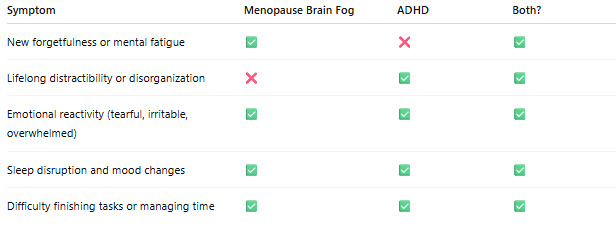ADHD & Menopause: The Overlooked Link Fueling Brain Fog, Forgetfulness, and Frustration
By: Dr. Jackie Piasta, DNP, WHNP-BC, MSCP
If you're in your 40s or 50s and suddenly feel like your brain has short-circuited—you're not imagining it.
✔️ You lose your train of thought mid-sentence.
✔️ You walk into rooms and forget why.
✔️ You start a task, then get distracted—and three hours later, it's still not done.
✔️ You feel overwhelmed, irritable, restless, or just… off.
For many women in midlife, these aren’t just signs of stress or “normal aging.” They’re symptoms of a deeper issue that often goes undiagnosed: ADHD exacerbated by menopause.
You’re Not Alone—And You’re Not Crazy
A 2023 survey by ADDitude Magazine of over 2,500 women revealed striking patterns:
Over 70% said their ADHD symptoms worsened during perimenopause or menopause.
More than half reported increased forgetfulness, distractibility, emotional reactivity, and difficulty initiating tasks.
Nearly 30% were first diagnosed with ADHD during midlife, often after years of struggling in silence.
These findings echo what we see in clinical practice: menopause doesn't cause ADHD, but for many women, it unmasks or amplifies symptoms that were previously manageable.
The Science: Estrogen, Dopamine & Executive Function
Here’s what’s happening behind the scenes:
Estrogen plays a key role in regulating:
Dopamine, the brain’s “motivation and attention” neurotransmitter
Working memory and mental flexibility
Emotional regulation and sleep quality
As estrogen declines in perimenopause, the brain’s ability to focus, prioritize, regulate emotions, and stay organized often takes a hit, especially in women who already have underlying ADHD traits.
This is why midlife can feel like cognitive freefall, even for women who’ve always “held it all together.”
Symptoms of ADHD
There are three broad types:
inattentive ADHD, where the main symptoms relate to difficulty concentrating
hyperactive/impulsive ADHD, where the main symptoms relate to hyperactivity or impulsive behavior
combined ADHD, which features both
Research suggests that inattentive ADHD is more common in girls than hyperactive ADHD. However, people of any gender can have any type.
Potential signs of inattentive ADHD include:
being easily distracted
appearing not to be listening
frequently forgetting things, such as important dates
frequently misplacing things, such as keys or their phone
trouble remembering daily tasks, such as brushing the teeth
difficulty following instructions from start to finish
difficulty concentrating, particularly if a task is not interesting enough
avoiding or disliking tasks that require effort for a prolonged period of time
Potential signs of hyperactive ADHD can include:
difficulty sitting still
frequent fidgeting
always being “on the go” or restless
difficulty waiting one’s turn
impulsivity, such as taking risks without thinking or interrupting others
There is some crossover between these symptoms and some of the potential effects of menopause. Around 70% of people going through menopause experience some form of cognitive or psychological symptom, such as difficulty thinking.
ADHD vs. Menopause Brain Fog: What’s the Difference?
These conditions often overlap, and for many women, the answer isn’t either/or… it’s both.
The Emotional Toll
Women in the ADDitude survey described feeling:
“Broken, disorganized, confused, overwhelmed, guilty, and scared.”
Others shared they felt dismissed by their providers, told it was "just hormones" or "just stress." At Monarch Health, we believe women deserve better than that.
We believe you deserve to be heard, taken seriously, and treated holistically.
We recognize that brain fog, memory lapses, and emotional dysregulation aren’t just “in your head”—they may be signs your brain and hormones need support.
Here’s how we approach it:
✔️ Step 1: A Comprehensive Evaluation
We assess your symptoms, hormone levels, sleep, lifestyle, stress load, and cognitive function. We ask the right questions to uncover overlooked ADHD patterns.
✔️ Step 2: Personalized Hormone Therapy
If appropriate, we may recommend hormone therapy to support estrogen and progesterone levels (maybe even testosterone), mood regulation, and cognitive clarity.
✔️ Step 3: ADHD Screening or Referral
If ADHD is suspected, we guide you toward formal diagnosis and work with your mental health or primary care provider to consider evidence-based treatments, including:
ADHD coaching
Cognitive-behavioral therapy (CBT)
Medications (stimulant or non-stimulant options)
You’re Not Failing. You’re Functioning Without Fuel.
If you feel like your brain, emotions, and ability to cope are unraveling during menopause, it’s not a character flaw, it’s a neurohormonal reality. And it’s treatable.
Whether you’ve had ADHD your whole life or are only now connecting the dots, we’re here to help you reclaim your clarity, confidence, and calm.





